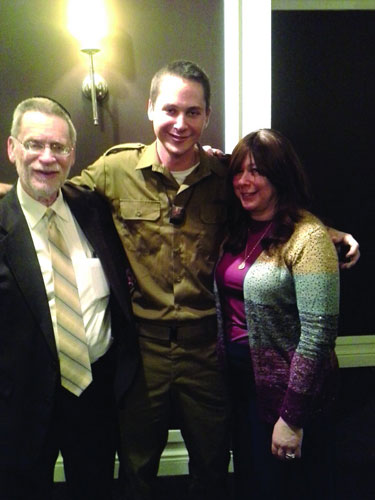.jpg)
.jpg)
Teaneck — Pinchas Shalom Silberstein, 22, studied at Moriah and TABC, went to Yeshiva in Israel at Netiv Aryeh, and now he’s a lone soldier in the Golani, an elite brigade of foot soldiers that is the most highly decorated and exclusive infantry unit of the Israel Defense Forces. “I’ve earned the right to say this is my country, this is my home and I’m doing something for it,” Silberstein said.
Silberstein was flown home recently to give a presentation about being a lone soldier for Friends of the IDF, which raises considerable funds to support lone soldiers, at events in Miami and the Meadowlands, in East Rutherford, NJ. Attending the Meadowlands event were Silberstein’s parents, Rabbi Harvey and Jan Silberstein of Teaneck.
“To be a lone soldier is a little bit different than serving as a regular soldier because, as a regular soldier you get to go home, see loved ones, and as a lone soldier, you don’t have that. In basic training, after five months of working hard, there was Parents Day, and obviously your parents are on the other side of the world. So everyone shows up to hug their son, and you just sit there and watch. It wasn’t a fun day, let’s put it that way,” Silberstein said.
Silberstein, instead of enrolling in college back home after a year in a post-high school Israeli yeshiva, said he volunteered for army service and was put on a base with 600 foreigners to do three weeks of basic training. Some foreigners are lone soldiers like Silberstein, but others are those who have moved to the country within the past seven years, and may take longer to adjust to the army. “I requested Golani and so did 200 of the other soldiers. Somehow I was lucky enough to be one of six foreigners accepted,” he said.
After his year and a half of duty in the Golani Brigade, the maximum time foreigners can serve, Silberstein came home, but soon decided to make aliyah. He returned to the same unit, with the same fellow soldiers. “We do arrest patrols, ambushes and anything else asked of us. I have been stationed in Ramallah, on the border of Gaza, the border of Egypt,” he said.
“I am a reconnaissance sharpshooter who specializes in demolition and explosives,” Silberstein said.
Jan Silberstein said that her son has said that if he’s not willing to fight for his country, he does not deserve to live there. “They want real people there who can be there to protect the country,” she said. “He’s always been very protective. He will always fight for the underdog, the weak person,” she said.
Last year, according to the Jewish Telegraphic Agency, there were approximately 5,000 lone soldiers, with close to 40 percent serving in combat units. About half are American. They are given extra monetary help with housing, and they are given extra time off to visit their families overseas and to take care of personal business, such as laundry and banking, things parents often do for currently serving Israeli soldiers. Organizational funds raised, such as the one maintained by Friends of the IDF, in partnership with Nefesh B’Nefesh, go toward guidance, support and care for lone soldiers at all stages of the process: prior to Aliyah, throughout military service and after release from the IDF. There are also three branches (Jerusalem, Tel Aviv and Haifa) of the Lone Soldier Center in Memory of Michael Levin, which is open 24 hours a day. The center assists lone soldiers with Shabbos and Yom Tov meals, host families, counseling and other educational and social opportunities.
To contribute to Friends of the IDF Loan Soldier program, please visit https://www.fidf.org/donate.
By Elizabeth Kratz










